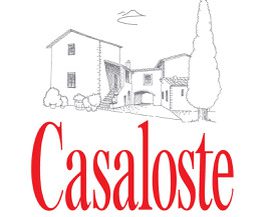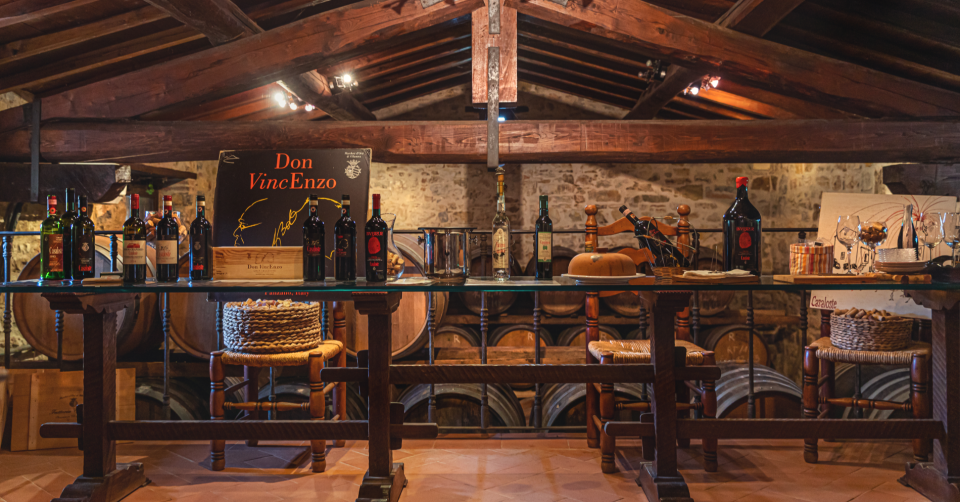Casaloste
Innovation and tradition in the heart of Chianti Classico
A special place

"Fattoria Casaloste" is a wine farm situated in the Chianti hills in Panzano in Chianti, municipality of Greve, near Florence, Italy. Fattoria Casaloste stretches for nearly 19 hectares, 10,5 of which are Chianti Classico vines, producing about 60,000 bottles of wine per year. The owner is Mr. Giovanni Battista d'Orsi, an agronomist and enologist. He oversees all wine making processes personally, starting from the gathering of grapes up to the refinement in French oak casks (wine bottling is carried out on the farm). The farm also welcomes guests to stay with us in two comfortable apartments decorated in Tuscan style, where it is possible to fully enjoy the beautiful Chianti landscape and environment by eating great food and drinking wonderful Chianti wines.

Competence and passion are the foundations upon which Giovanni d'Orsi and his wife Emilia have built their own company. A journey that Giovanni d'Orsi began with his university studies in Agriculture and later solidified through Enology Master's programs. Emilia d'Orsi, on the other hand, is responsible for the marketing and commercial aspects of the business.
Goal
High Quality Wines

First company to obtain certification, Casaloste has adopted a strict policy of organic farming and is registered with the Organic Producers of Tuscany under the direct supervision of ICEA (Institute for Ethical and Environmental Certification). But all of this is not enough; wine, and Chianti Classico in particular, is a living entity, a creation of man, and like all living things, it needs love to exist. Giovanni d'Orsi's goal is to produce exceptional Chianti Classico, and to achieve this objective, he has organized his life.
Casaloste è la sua unica proprietà dove vive con la sua famiglia che partecipa alla gestione dell’azienda.
Fare vino quindi è il suo unico mestiere e tutto ciò rende l’azienda particolarmente affidabile, sia dal punto di vista della bontà del prodotto nel tempo, che per la sua stabilità: sarà sempre produttore di vino.
The productive process
From the vineyard to the bottle

Pressing and removing grapes from the bunch is done in sophisticated stainless steel machinery that can vary the speed and intensity of pressing. Fermentation takes place only in stainless steel vats at a constant temperature. Ageing is surely one of the most important moments for wine. The use of French Oak allows to find a good balance between the oaky taste and the fruit, giving the final product a harmony of sensations both in taste and smell. During this delicate phase, wine-making is sustained by laboratory analysis and tasting. After the bottling, the wine is stored in cellars with a controlled temperature so the wine never rises above 17° C, even in summer. As a result of all these efforts we have a product of high quality that evolves constantly in the pursuit of excellence, harvest after harvest.
Innovation and tradition
"Be small to make great wines"

The general organization of Fattoria Casaloste reflects the typical Tuscan tradition of farm activities linked to the seasons. But in detail, things change even radically.
The motto of the winery, "Essere piccoli per fare grandi vini" ("Be small to make great wines"), encloses the entire wine-making philosophy of Fattoria Casaloste.
Being small means dedication to careful inspection of the grapes on the vines, correct pruning, prompt and selective action in case of disease and choosing the exact best time for harvest and other timely interventions. Being small means the flexibility to avoid damaging days of rain during harvest or prolonged ripening in splendid, sunny October days. And more: in the cellars special machines are used to avoid “stress” to wines. During the wine-making, the ageing and throughout all other phases, constant analysis and quality controls are carried out.
Organic choice
Love and Respect for our land and our work

The choice of organic agriculture was born following the studies that Giovanni Battista d'Orsi undertook on his path at the University of Agriculture and continued after his master degree in environmental impact assessments. With the purchase of Casaloste in 1992, Giovanni then attended a Masters in Oenology and was able to put into practice all his skills in this matter, deciding immediately to start the production using organic farming methods.
With the purchase of Casaloste in 1992, Giovanni then attended a Masters in Oenology and was able to put into practice all his skills in this matter, deciding immediately to start the production using organic farming methods.
As an agronomist, Giovanni has always considered organic farming as a system of cultivation that is not different for production, quality and efficiency, from the conventional one, but which follows a scale of priorities organized to be absolutely compatible with the environment in which it operates.
The main cultivation rules can be summarized as follows: use of cultivation practices that take into account the structure and balance of the land; use of organic fertilizers; exclusion of chemical synthesis products. The Certification obtained by institutions recognized by EU certifies the regularity of organic farming practices.
It is important to underline that organic farming does not renounce technological progress and scientific research, but combines efficiency of productivity and quality with environmental balance and sustainability.
A courageous choice at the time: first certified organic farm (1994) of Panzano in Chianti and among the first ones in the entire territory of Chianti, the choice of the Bio was a real challenge.
La convinzione dell’importanza dell’utilizzazione di metodi di agricoltura biologica sul territorio, è stata poi condivisa con altre Aziende produttrici di Panzano, con cui Casaloste ha costituito l’Unione Viticoltori di Panzano.
L’Unione, nata nel 1996, lega principalmente i produttori in un vincolo di amicizia, condividendo gli stessi obiettivi di qualità dei prodotti e del rispetto dell’ambiente pur mantenendo ognuno la propria identità.
This common commitment has led to the recognition of Panzano as excellence in organic production with about 90% of the organic certified area of Panzano.
In terms of sustainability and respect for the environment, Unione Viticoltori has funded the creation of the SPEVIS Experimental Station, a private facility that studies advanced solutions and strategies to limit the use of insecticides in the management of organic vineyards.
The first monitoring actions, meteorological data surveys, controls and experiments on the territory, has started in Panzano in Chianti, with the intent of observing any critical issues and preventing them using only organic farming methods.
The coordination between the companies is realized through technical-practical bulletins with suggestions on the actions to be carried out in the field.
A team work that helps producers to maintain closer monitoring in the field and to find eco-friendly solutions, whose benefits are reflected in the value of the products obtained.

